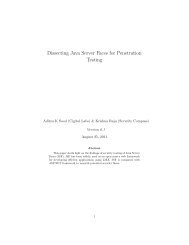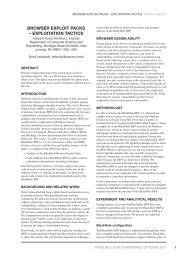Devices - Penetration Testing Like a Hacker. - SecNiche Security Labs
Devices - Penetration Testing Like a Hacker. - SecNiche Security Labs
Devices - Penetration Testing Like a Hacker. - SecNiche Security Labs
You also want an ePaper? Increase the reach of your titles
YUMPU automatically turns print PDFs into web optimized ePapers that Google loves.
and not only to those that have the means to pay largeamounts of money.How does Hatforce makes moneyHatforce connects the clients who want to test theirproducts and the testers interested in being rewardedfor finding vulnerabilities.In order to make the service the most usable forclients, Hatforce offers them consulting services. Theseconsulting services are applied to the vulnerabilitiesfound by the testers. When a tester describes avulnerability description, the client has to verify thevulnerability. If it is a correct vulnerability and it respectsthe testing scope of the test, it will be approved andpaid.Knowledge and time is necessary to verify thetechnical details of a vulnerability. As a consultingservice, Hatforce can test the vulnerability descriptionsand say if the vulnerability has to be approved or not.For an approved vulnerability, Hatforce can advise theclient on how to fix it. Furthermore, once a vulnerabilityhas been fixed, Hatforce can perform a retest of theproduct and verify if the problem has been correctlyclosed.As this system would not scale if a lot of clients startusing the platform in the future, Hatforce considerssubsequently involving some of the testers in itsconsulting system. A new category of testers wouldbe created – the certified testers. The certified testerswould agree on providing consulting services forthe security vulnerabilities of a client’s product andthey would also be entitled to approve or disapprovevulnerabilities.Difficulties and their solutionsThere are certainly several difficulties and limits thatcrowd-sourcing brings which are described in thefollowing paragraphs.Is it possible to trust an unknown tester?In order to have access to a test, the tester engageshimself in a contract with the client and accepts itsterms and conditions. This ensures that his testingactivity is entirely legal. Nevertheless, there arealways villains of both sides (clients and testers) thatare not eager to respect any rule. Therefore, Hatforceintroduces an evaluation system for testers and clients.If a tester submits a vulnerability, the client is able toevaluate his work by giving him a +1 or a -1 followedby a compulsory comment that explains his decision.The same procedure is possible in the reverse way– a tester can evaluate in the same way thecompany.Can the tester be sure that the company will pay?It is possible that some clients don’t want to approvevulnerabilities or pay their testers. After the clienthas evaluated one of his submitted vulnerabilities,the tester is able to evaluate the company. If a clientdoes not approve a vulnerability description, he shouldstate why and the tester can then respond with anevaluation.A client should be aware that if he has not enoughpositive evaluations (or too many negatives) thenthe testers will most likely not participate at his testsanymore.The Client will try to contact the testers ofHatforce directlyA client may try to contact directly a penetrationtester without going through the platform of Hatforce.However, it is in the own interest of the client to usethe global knowledge of the community in order tofind security problems. The more testers get to testa product of a client, the better it is for the client. Ifa company engages a tester in private, the costs willbe comparable to a standard expensive penetrationtest and the client loses the benefit of the system ofHatforce.Somebody could request a penetration test for awebsite or server he is not the owner ofHatforce has to make sure that the client is really thegenuine owner of the product he wants to have tested.Therefore, Hatforce will contact the client each time hesends a test request and will validate the ownership.Is a penetration test legal?A penetration test is generally illegal if there exists nospecific agreement between the owner of the productto be tested and the tester. Therefore, a writtencontract is needed between the client and the tester.On Hatforce.com clients can use the classic contractwhich has been checked by a German lawyer or contactHatforce and propose a customized contract.The client should be aware that it is the best for himif he states the most clearly what he is awaiting fromthe testers and if he wants to forbid anything during thetests.Is it practical to request a crowd-sourcingpenetration test on a production system?Google and Facebook are doing it now. Usually ifsomeone finds a XSS vulnerability this does not stopa website from working. If someone tries to trigger aDenial of Service attack on a production system, or triesto exploit a buffer overflow, this might be a more serious05/2011 (5) SeptemberPage 39http://pentestmag.com












